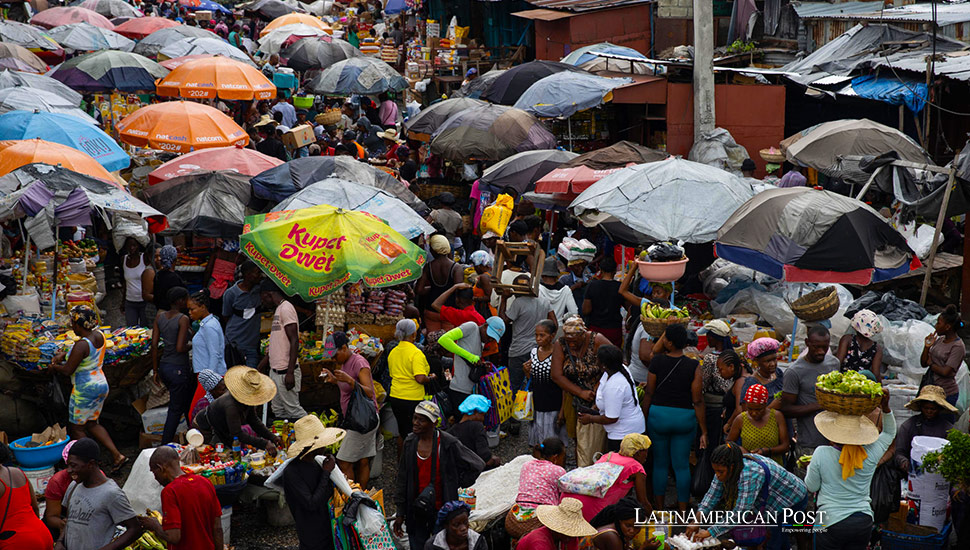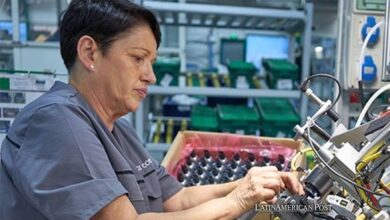Haiti’s Market Vendors and Buyers Navigate Trash and Chaos

Despite the challenging conditions, the Petionville market in Port-au-Prince remains bustling with activity. Vendors and buyers maneuver through mud, garbage, and flies, highlighting Haiti’s capital’s urgent need for improved sanitation and security.
The Petionville Market, a historical and cultural landmark in Port-au-Prince, Haiti, is a hive of activity on a typical Sunday. However, beneath the surface of this bustling commerce lies a harsh reality. The market, which has been a symbol of resilience and economic activity for centuries, is now overwhelmed by mud, garbage, and swarms of flies, creating an environment that affects both vendors and buyers. Amid these challenging conditions, the market remains a crucial hub for many Haitians struggling to make a living.
Gallinne, a hardworking rice vendor, sits surrounded by her merchandise and swarms of flies. Her voice is filled with frustration as she shares her plight, “Customers run away because the trash is so close,” she lamented to EFE, gesturing towards the rotting fruits and tomatoes behind her stall. These unsanitary conditions have a direct impact on her sales. Previously, she sold various goods, including beans, wheat flour, and sugar, but the filth now limits the amount of merchandise she can bring to the market.
To maintain some level of cleanliness, vendors like Naomi occasionally pool their money to pay someone to remove the trash. However, when funds are insufficient, they are left to sell their goods amid the garbage. Naomi, a vendor of ten years, echoes this sentiment. She notes that customers avoid her stall due to the surrounding trash and stagnant water, which attract mosquitoes. Despite these challenges, she remains hopeful and determined to continue her business.
Health Concerns and Historical Context
Haiti’s history of health crises exacerbates the current situation. Following the devastating 2010 earthquake, a cholera outbreak claimed over 10,000 lives. The presence of stagnant water and garbage in the Petionville market heightens fears of disease resurgence, with vendors and buyers acutely aware of the risks.
The newly established Presidential Transition Council in Haiti has announced a significant cleanup campaign for the metropolitan area of Port-au-Prince, aiming to address these severe sanitation issues. This initiative responds to the growing public health concerns and seeks to restore some hygiene to the markets.
Insecurity Adds to the Woes
In addition to sanitation problems, insecurity poses a significant challenge. Naomi explains that fear of violence and shootings keeps many people from venturing into the market. This insecurity forces her to adjust her working hours, arriving later and leaving earlier to avoid potential dangers. “I used to come early because morning sales are better before the midday heat. Now, I have to arrive later and leave early,” she tells EFE.
Galinne faces similar issues, noting that her sales have plummeted. The economic hardship, high unemployment, and rising prices add to the struggle. “A customer comes with 500 gourdes (about $3.5), which is only enough to buy a pound of rice and beans,” she says, highlighting the financial strain on vendors and buyers.
Political Instability and Efforts for Change
Haiti’s political landscape has been turbulent. The resignation of Prime Minister Ariel Henry and the establishment of a Presidential Transition Council mark significant changes aimed at stabilizing the country. This council oversees the transition, organizes presidential elections, and addresses the country’s severe security and economic conditions.
The recent violence, which claimed 8,000 victims last year, has intensified since February. In response, international efforts are being mobilized to support Haiti. The multinational security mission led by Kenya, endorsed by the United Nations, is expected to deploy soon. This mission aims to curb rampant violence and restore order.
Economic Challenges and Historical Struggles
Haiti’s economic battles are deeply ingrained in its past. Once the most affluent French colony, Haiti’s independence in 1804 sparked a protracted struggle with political instability and financial adversity. The 2010 earthquake dealt a devastating blow, resulting in significant loss of life and infrastructure devastation.
The informal economy, including markets like Petionville, is critical in sustaining livelihoods. However, inadequate infrastructure and services, coupled with high living costs, exacerbate the daily challenges faced by Haitians. The presence of international aid, while essential, also highlights the need for sustainable, locally-driven solutions.
A Glimmer of Hope Amidst Adversity
Vendors like Galinne and Naomi strive for a better future despite the grim conditions. The government’s cleanup campaign and the anticipated international security support offer a glimmer of hope. These efforts aim to improve the living conditions and economic prospects of those relying on the market for their livelihoods.
As Haiti confronts these multifaceted challenges, the indomitable spirit of its people remains a potent force. With sustained efforts and support, the potential for transformative change is within reach, paving the way for a more secure and prosperous future for the nation.
Also read: A Firm Stance Against Extortion: Charting a Path for Haiti Without Capitulation
The vendors and buyers of the Petionville market, in the face of adversity, embody the resilience and determination of the Haitian people. They persist, undeterred by unsanitary conditions, economic hardship, and insecurity. The ongoing efforts to clean up the market and improve security, bolstered by international support, ignite a beacon of hope for a brighter future. As Haiti forges ahead towards stability and development, the unwavering commitment of its people to their livelihoods and communities stands as a testament to their strength.





